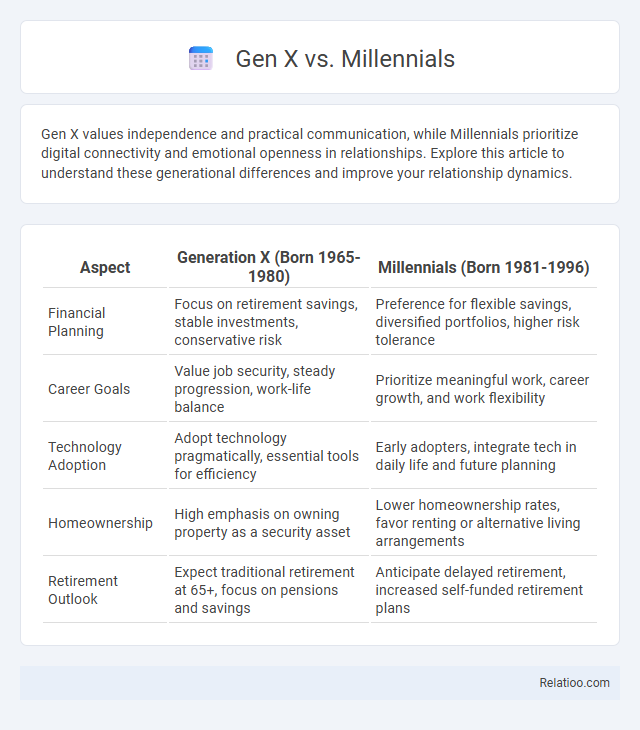Gen X values independence and practical communication, while Millennials prioritize digital connectivity and emotional openness in relationships. Explore this article to understand these generational differences and improve your relationship dynamics.
Table of Comparison
| Aspect | Generation X (Born 1965-1980) | Millennials (Born 1981-1996) |
|---|---|---|
| Financial Planning | Focus on retirement savings, stable investments, conservative risk | Preference for flexible savings, diversified portfolios, higher risk tolerance |
| Career Goals | Value job security, steady progression, work-life balance | Prioritize meaningful work, career growth, and work flexibility |
| Technology Adoption | Adopt technology pragmatically, essential tools for efficiency | Early adopters, integrate tech in daily life and future planning |
| Homeownership | High emphasis on owning property as a security asset | Lower homeownership rates, favor renting or alternative living arrangements |
| Retirement Outlook | Expect traditional retirement at 65+, focus on pensions and savings | Anticipate delayed retirement, increased self-funded retirement plans |
Defining Gen X and Millennials
Gen X, born between 1965 and 1980, is characterized by independence, adaptability, and skepticism shaped by economic recessions and the rise of digital technology. Millennials, born between 1981 and 1996, prioritize purpose-driven work, technological fluency, and collaboration, influenced by globalization and social media. Understanding these distinct generational traits helps you tailor communication and expectations effectively across different age groups.
Key Cultural Differences
Gen X values independence and skepticism shaped by economic instability and technological transition, while Millennials prioritize digital connectivity and social consciousness influenced by globalization and social media. Generational expectations diverge as Gen X emphasizes work-life balance and self-reliance, whereas Millennials seek purpose-driven careers and collaborative environments. Cultural differences reflect varied attitudes toward authority, communication styles, and consumption habits, impacting workplace dynamics and marketing strategies.
Technology Adoption and Usage
Gen X individuals tend to adopt technology pragmatically, valuing tools that improve productivity and work-life balance, while Millennials prioritize seamless digital integration and social connectivity in their usage patterns. Your expectations for technology often reflect these generational traits, influencing preferences for intuitive interfaces, mobile accessibility, and constant connectivity. Understanding these differences helps tailor technology solutions to meet the distinct needs of each generation effectively.
Career Aspirations and Work Styles
Generation X values work-life balance and independence, often seeking job stability while embracing flexibility and technology. Millennials prioritize meaningful work, career growth, and collaborative environments, showing a preference for purpose-driven roles and digital communication. Generational expectations highlight that while Gen X employees favor autonomy and self-reliance, Millennials emphasize teamwork, continuous learning, and alignment with company values in their career aspirations and work styles.
Attitudes Towards Money and Saving
Generation X tends to prioritize financial stability and practical savings strategies, often valuing retirement planning and emergency funds more than Millennials, who focus on experiences and flexible spending while showing less consistent saving habits. Millennials exhibit a preference for digital banking, investing via apps, and socially responsible financial choices, reflecting an adaptive approach to money shaped by economic uncertainty and student debt. Generational expectations reveal that Gen X values loyalty and long-term financial growth, whereas Millennials emphasize financial independence and immediate gratification, shaping distinct attitudes toward wealth accumulation and saving trends.
Family Life and Relationships
Gen X values independence and often prioritizes work-life balance, leading to smaller, delayed family formations compared to Millennials, who emphasize flexibility, emotional connection, and dual-career partnerships in family life. Millennials are more likely to challenge traditional roles and seek egalitarian relationships, reflecting shifting expectations in parenting and cohabitation dynamics. Generational expectations reveal that Gen X tends to prefer privacy and stability in relationships, while Millennials advocate for transparency and emotional expressiveness, reshaping modern family structures.
Educational Backgrounds
Gen X typically values formal education with a strong emphasis on traditional college degrees, often holding bachelor's and master's qualifications, while Millennials tend to pursue diverse educational paths including online courses and certifications alongside conventional degrees. Generational expectations highlight that Millennials prioritize practical skills and lifelong learning to adapt to rapidly changing industries, compared to Gen X's preference for established academic credentials. Your educational background influences career opportunities differently across these generations, reflecting shifting norms in skill acquisition and professional development.
Social and Political Views
Gen X tends to prioritize economic stability and pragmatic social policies, often showing moderate political views, while Millennials lean toward progressive ideals emphasizing social justice, climate change, and inclusivity. Social expectations for Gen X emphasize individualism and self-reliance, contrasting with Millennials' collective approach to community and activism. These differing generational attitudes significantly influence voting behaviors and policy support, shaping contemporary political landscapes.
Media Consumption Habits
Gen X tends to prefer traditional media such as television and print, while Millennials heavily engage with digital platforms including social media and streaming services. Your media consumption is shaped by these generational preferences, with Gen Z pushing further into mobile-first and immersive content like short videos and interactive experiences. Understanding these distinct habits helps marketers tailor content strategies that resonate effectively across Gen X, Millennials, and younger audiences.
Future Trends: Bridging the Generation Gap
Future trends in bridging the generation gap emphasize leveraging technology and communication styles tailored to both Gen X and Millennials, enhancing workplace collaboration and innovation. Your organization's ability to integrate these generational expectations fosters a culture of mutual respect and adaptability, crucial for sustained growth. Data shows that companies investing in intergenerational mentorship programs experience higher employee engagement and retention rates.

Infographic: Gen X vs Millennials
 relatioo.com
relatioo.com